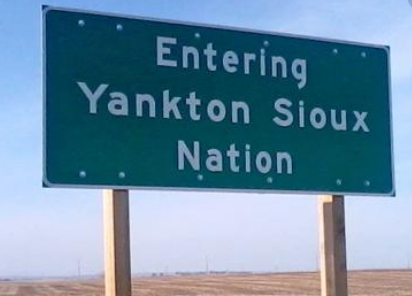
- Details
- By Levi Rickert
YANKTON INDIAN RESERVATION — A tribal citizen of the Yankton Sioux Tribe, based in Wagner, S.D. has been diagnosed with COVID-19, commonly referred to as the coronavirus.
The person, who has not been identified, was on travel last week on behalf of the tribe and has been isolated at home according to an unnamed source.
The Indian Health Service (IHS) released a press statement late Wednesday afternoon announcing that a patient from Charles Mix County, S.D., is presumed positive for COVID-19.
On Wednesday, March 11, 2020, Tribal Chairman Robert Flying Hawk released the following memorandum that announced tribal employees were given administrative leave and tribal offices will closed until next Monday, March 16:
“The Yankton Sioux Tribe has made the decision to close all tribal entities from March 11, 2020 through March 13, 2020. All staff and offices are to re-open on March 16, 2020 for regular business.
This determination was to allow those entities to thoroughly clean and disinfect their offices, buildings and workspaces, equipment. Experts say, it is best to use bleach and soapy water or a disinfectant cleaner and open windows to air dry the location. If there are no windows, then just allow the area to air dry.
Local schools that serve the Tribe are also closing at the recommendation of the State.
The Yankton Sioux Tribe has some 11,500 tribal citizens, with 6,500 residing on the Yankton Indian Reservation.
This a developing story, Native News Online will provide more information when it becomes available.
More Stories Like This
Native News Weekly (August 25, 2024): D.C. BriefsUS Presidents in Their Own Words Concerning American Indians
Haaland Meets with Southern New Mexico Law Enforcement on Public Safety Priorities
This Day in History – Dec. 26, 1862: 38 Dakota Men Executed by Order of Abraham Lincoln
Merry Christmas 2025
Help us defend tribal sovereignty.
At Native News Online, our mission is rooted in telling the stories that strengthen sovereignty and uplift Indigenous voices — not just at year’s end, but every single day.
Because of your generosity last year, we were able to keep our reporters on the ground in tribal communities, at national gatherings and in the halls of Congress — covering the issues that matter most to Indian Country: sovereignty, culture, education, health and economic opportunity.
That support sustained us through a tough year in 2025. Now, as we look to the year ahead, we need your help right now to ensure warrior journalism remains strong — reporting that defends tribal sovereignty, amplifies Native truth, and holds power accountable.
 The stakes couldn't be higher. Your support keeps Native voices heard, Native stories told and Native sovereignty defended.
The stakes couldn't be higher. Your support keeps Native voices heard, Native stories told and Native sovereignty defended.
Stand with Warrior Journalism today.
Levi Rickert (Potawatomi), Editor & Publisher

